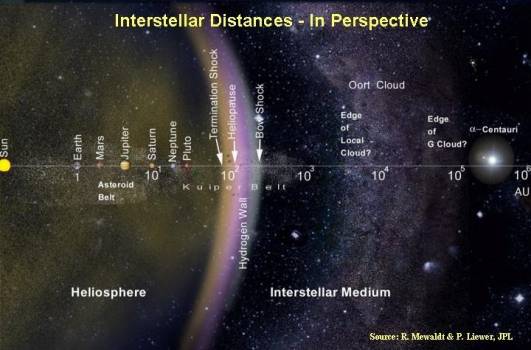After reading an article entitled "How Long Would it Take to Travel to the Nearest Star?" on Universetoday.com, I'd have to say it's possible - but unlikely to happen in our lifetime.
The nearest star to our solar system is called Proxima Centauri ("proxima" means close to in Latin). It's actually over 4.22 light years away, and forms part of a three-star system called Alpha Centauri.

While colonizing a distant planet or moon might theoretically be possible, the problem is in the "commute".
How long would it take to get to the nearest solar system?
The fastest spacecraft ever launched was named Helios 2. It's mission was to approach the sun, and it managed to reach speeds of 240,000 km/hr (150,000 miles/hr) - mainly due to the sun's huge gravitational force.
Using Jupiter or Saturn to give a spacecraft a "gravitational assist" is therefore the quickest way we can currently get out of our solar system, but even that method would mean a journey of around 20,000 years!
Any other bright ideas?
Sure, there are theories about wormholes, warp speed and altering the time/space continuum - but that's all science fiction (for now).
The most realistic way of travelling out of the universe is something called nuclear pulse propulsion.
The simple explanation is that the spacecraft would be pushed through space using controlled nuclear fusion explosions.
Here's a pretty interesting video about a proposed project called Daedalus that is based on this model (I'd recommend muting before watching - the soundtrack is terrible):
This kind of technology would be capable of reaching 12.2% the speed of light. Taking into consideration realistic travel speed, this would allow us to reach Proxima Centauri in about 80 years.
SO... If the governments of the world can put aside their differences, invest defense budget and resources into space exploration, and then find a group of people who are willing to travel into space for the rest of their lives in order for their descendants to colonize a new solar system, then we might be onto something.
Wacky bonus thought
Thinking out of the box for a second... I wonder whether the next step in getting out of this solar system might come in a much more unexpected way.
For example, if you look at what people in 1899 thought the year 2000 would look like:

Those guys back in 1899 were too busy wondering about the next step in aviation and people flying around like giant dragonflies, they didn't consider the possibility that most of us will just sit around at home using Facetime on an iPad instead of flying out of the window to see each other.

What if, rather than focusing on how to propel giant spaceships through vast amounts of space, we instead developed a way for humans to exist in the most "sustainable" way possible: As factories of brains!
Stick with me on this one.
With dwindling resources on our planet, it seems inevitable that humans need to find a more sustainable way to survive. With technology providing ever-more sophisticated virtual worlds for us to socialize and "experience" the world - it seems to me that our physical bodies are becoming more and more redundant.
What if, rather than being born with a fully functioning body etc... Human brains were harvested in huge factories stored securely somewhere in the Earth, and maintained by robots.
See it as a sort of "human minimum viable product".
Our brains are essentially responsible for everything we think, see, hear, smell... The rest of our body just helps us keep the brain going by eating, breathing, and getting us around.

If the eating, breathing, and getting around bit was supplied to our brain on tap artificially, then all that flesh and bone becomes kind of redundant.
A brain floating around in jelly requires a lot less oxygen and energy to function than an entire human body, which is also susceptible to more illness, injury, complications through aging etc...Now, I kind of envisage most brains being stored in a giant warehouse - sort of like a massive Ikea of brains, below the Earth's surface.
It's not that different from the bunkers of computer servers Google uses to map the internet.
Our interactions and lives could be played out through a virtual "interface" - much like The Matrix, and if we really needed to wander about in the physical world, we could do so through an artificial exoskeleton, a bit like that character Krang from the cartoon series Teenage Mutant Ninja Turtles:

Well, the simple answer is that given the minimal requirements and improved durability that I'd imagine our brains to have, we could launch them out into space in much smaller capsules, requiring a lot less energy, and not having to worry about things like oxygen levels or radiation to the same extent that a full human body would (to clarify, these would still be issues - but at a more manageable scale).
Obviously, we'd need a fleet of nano-bots to help us set up base and begin synthesising the requirements for human sustainability once we land on a hospitable planet in the Alpha Centauri system.

Anyway, yes, I realize this is a bit of a far-fetched tangent, but if this actually happens remember where you read about it first!